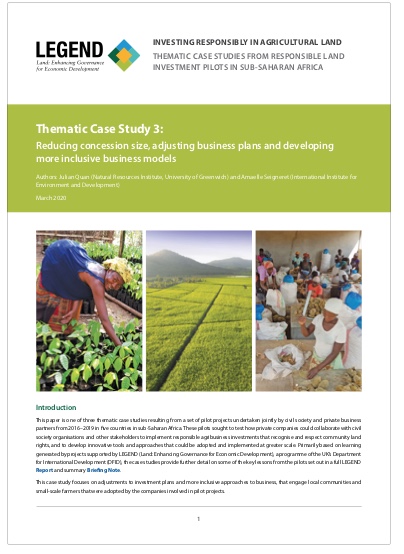About us
"Building a world where people, in particular women, and responsible businesses have secure land tenure rights to invest, thrive and contribute to inclusive and sustainable economic development."
Land: Enhancing Governance for Economic Development (LEGEND) is a £38mn DFID global programme running from May 2015 to March 2021. LEGEND was designed to mobilise knowledge and capacity for design and delivery of new land-related programmes, improve land governance as an essential and inclusive basis for economic development, and strengthen land and property rights at scale.
LEGEND
LEGEND aims to improve the quality and impact of land investments so they contribute sustainably to growth while safeguarding rights and opportunities for poor people, rural and urban, and especially women. It has done this through: building policy coherence globally using internationally agreed principles and guidelines, such as the VGGT and CFS RAI principles; promoting application of emerging good practice emerging across countries; and stimulating the development of innovative tools and partnerships involving civil society, private sector and governments at global, country and local levels.
Members:
Resources
Displaying 1 - 5 of 19Options for Securing Tenure and Documenting Land Rightsin Mozambique: A Land Policy & Practice Paper
One of the key aspects of the Mozambican legal framework for land is that Mozambican nationals can acquire tenure rights through inheritance, via peaceful occupation or through customary channels These usufruct tenure rights, known by the Portuguese acronym ‘DUAT’ (Direito de Uso e Aproveitamento da Terra), can be held individually or jointly.
Reducing concession size, adjusting business plans and developing more inclusive business models
This paper is one of three thematic case studies resulting from a set of pilot projects undertaken jointly by civil society and private business partners from 2016–2019 in five countries in sub-Saharan Africa. These pilots sought to test how private companies could collaborate with civil society organisations and other stakeholders to implement responsible agribusiness investments that recognise and respect community land rights, and to develop innovative tools and approaches that could be adopted and implemented at greater scale.
Reducing concession size, adjusting business plans and developing more inclusive business models
This paper is one of three thematic case studies resulting from a set of pilot projects undertaken jointly by civil society and private business partners from 2016–2019 in five countries in sub-Saharan Africa. These pilots sought to test how private companies could collaborate with civil society organisations and other stakeholders to implement responsible agribusiness investments that recognise and respect community land rights, and to develop innovative tools and approaches that could be adopted and implemented at greater scale.
Reducing concession size, adjusting business plans and developing more inclusive business models
This paper is one of three thematic case studies resulting from a set of pilot projects undertaken jointly by civil society and private business partners from 2016–2019 in five countries in sub-Saharan Africa. These pilots sought to test how private companies could collaborate with civil society organisations and other stakeholders to implement responsible agribusiness investments that recognise and respect community land rights, and to develop innovative tools and approaches that could be adopted and implemented at greater scale.
Reducing concession size, adjusting business plans and developing more inclusive business models
This paper is one of three thematic case studies resulting from a set of pilot projects undertaken jointly by civil society and private business partners from 2016–2019 in five countries in sub-Saharan Africa. These pilots sought to test how private companies could collaborate with civil society organisations and other stakeholders to implement responsible agribusiness investments that recognise and respect community land rights, and to develop innovative tools and approaches that could be adopted and implemented at greater scale.


